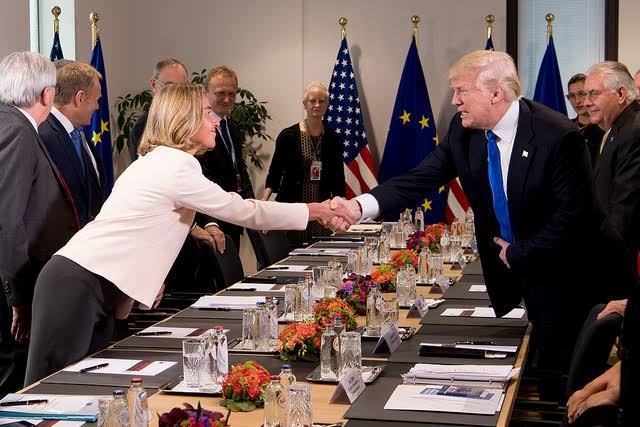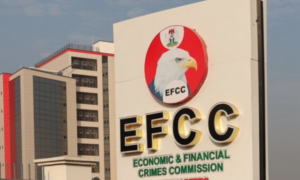
As senior officials from Iran and the remaining signatories to its 2015 nuclear deal met Friday to try and keep the agreement alive, the Trump administration made it clear that European nations had to choose between doing business with Iran, or doing business with the U.S.
With tension high in the Persian Gulf, Tehran is poised to surpass a uranium stockpile threshold, posing a threat to the accord. At the heart of the meeting in Vienna is Iran’s desire for European countries to deliver on promises of financial relief from U.S. sanctions. Iran is insisting that it wants to save the agreement and has urged the Europeans to start buying Iranian oil or give Iran a credit line to keep the accord alive.
The regular quarterly meeting of the accord’s so-called joint commission, which brings together senior officials from Iran, France, Germany, Britain, Russia, China and the European Union, is meant to discuss implementation of the deal.
But as they met, U.S. Special Representative for Iran Brian Hook urged top European diplomats to get tougher on Iran, instead of clinging to the nuclear deal, and he said any nation that chooses to buy Iranian oil will pay a price.
“We will sanction any imports of Iranian crude oil,” Hook said in London, according to the Reuters news agency. “There are right now no oil waivers in place…We will sanction any illicit purchases of Iranian crude oil.”
The Trump administration infuriated Iran by not only backing out of the nuclear agreement signed under President Obama’s watch, but then hitting Iran with some of the harshest economic sanctions ever and declaring it would seek to bring Iran’s oil revenue down to zero. The goal of the White House is to cripple Iran’s economy in hopes of forcing Tehran into negotiating a wider-ranging deal, but thus far the strategy has yielded no change in tack from Tehran.
Trump says “no rush”
President Donald Trump said on the sidelines of the Group of 20 summit in Japan that “there’s no rush” to ease the tensions with Iran.
“There’s absolutely no time pressure,” he added. “I think that in the end, hopefully, it’s going to work out. If it does, great. And if doesn’t, you’ll be hearing about it.”
Iran recently quadrupled its production of low-enriched uranium. It previously said it would surpass a 300-kilogram stockpile limit set by the accord by Thursday, but an Iranian official said that it was 2.8 kilograms below that limit Wednesday and there would be no new assessment until “after the weekend.” It is currently a holiday weekend in Iran.
European countries are pressing for Iran to comply in full with the accord, though they have not specified what the consequences would be of failing to do so. Iranian officials maintain that even if it surpasses the limit, it would not be breaching the deal, and say such a move could be reversed quickly.
The Europeans also face a July 7 deadline set by Tehran to offer long-promised relief from U.S. sanctions, or Iran says it will also begin enriching its uranium closer to weapons-grade levels.
On Thursday, Iranian state television reported that Foreign Minister Mohammad Javad Zarif sent a letter urging European signatories to the accord to implement their commitments, saying Iran’s next steps depend on that.
Britain, France and Germany are finalizing a complicated barter-type system known as INSTEX to maintain trade with Iran and avoid U.S. sanctions, as part of efforts to keep the nuclear deal afloat. It would help ensure trade between Iran and Europe by allowing buyers and sellers to exchange money without relying on the usual cross-border financial transactions.
Rising tension in the Gulf
Tensions have been rising in the Middle East. Citing unspecified Iranian threats, the U.S. has sent an aircraft carrier to the region and deployed additional troops alongside the tens of thousands already there.
The U.S. has been worried about international shipping through the Strait of Hormuz since tankers were damaged in May and June in what Washington has blamed on limpet mines from Iran, although Tehran denies any involvement. Last week, Iran shot down a U.S. Navy surveillance drone, saying it violated its territory; Washington said it was in international airspace.
War with Iran is “not necessary,” Hook said. “We are not looking for any conflict in the region.”
He added that the U.S. would “respond with military force” if any of its personnel were attacked by Iranian forces, however. The U.S. is trying to drum up support for an international naval force in the Persian Gulf, notably to protect shipping.
Other G20 nations weigh in
German Chancellor Angela Merkel met Mr. Trump Friday on the sidelines of the G20 summit. She said they discussed Iran “and the question of how we can get into a negotiating process, which I advocated very strongly.”
Chinese President Xi Jinping, also attending the summit, said that the Gulf region stands “at a crossroads of war and peace,” news agency Xinhua and state broadcaster CCTV reported.
“China always stands on the side of peace and opposes war,” Xi said, calling on all sides to remain calm, exercise restraint and promote dialogue.
U.N. Secretary-General Antonio Guterres said the world can’t afford a conflict. He said it was “essential to de-escalate the situation” and avoid confrontation.
You may be interested

PSG To Reignite Interest In Osimhen
Webby - December 21, 2024Paris Saint-Germain have contacted Napoli to discuss signing Victor Osimhen in January, according to reports in France.It is reported that…

Arteta Provides Injury Updates On Five Arsenal Players Ahead Palace Clash
Webby - December 20, 2024Arsenal manager Mikel Arteta has revealed that Declan Rice and Riccardo Calafiori are both available to be in the Gunners…

Carabao Cup: Spurs Edge Man United In Seven-Goal Thriller To Reach Semi-finals
Webby - December 19, 2024Tottenham Hotspur edged Manchester United 4-3 in the quarter-finals of the Carabao Cup on Thursday.Spurs raced to a 3-0 lead…




















![American Pastor, David Wilson Seen Eating The Box Of Woman Who Isn’t His Wife [Video]](https://onlinenigeria.com/wp-content/uploads/2019/10/american-pastor-david-wilson-seen-eating-the-box-of-woman-who-isnt-his-wife-video-150x150.jpg)









